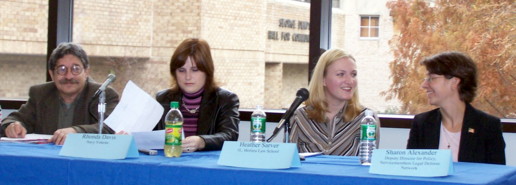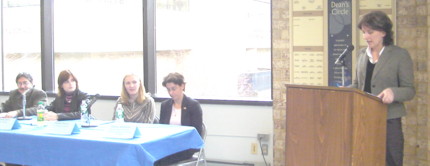|
Hofstra
Asked, We Told
Hofstra
University Law School DADT Panel Nov. 15, 2006
Rhonda
K. Davis
Former Petty Officer 1st Class, U.S. Navy

On November 15th, a panel
of four gathered inside the Law School at Hofstra
University in Hempstead , New York , to talk to
students and faculty about the military’s
“don’t ask, don’t tell” policy. To
an attentive crowd of about 35 students, Sharon
Alexander (Service Members Legal Defense Network),
Heather Sarver (Air Force veteran and Law student
at Hofstra, responsible for organizing the event),
Denny Meyer (President of American Veterans for
Equal Rights New York), and myself, Rhonda Davis (former
Navy Journalist), presented history, research, and
many personal accounts of how DADT is a bad policy
for all Americans.
Sharon ’s speech kicked
off the event. After the moderator
introduced her, Sharon moved from behind the table
where the rest of us sat, to a standing position
closer to where the audience members sat.
With a commanding confidence, Sharon expertly
broke down the myths behind DADT: that a
simple act such as hand-holding between two people
of the same gender is a violation of the policy;
that there is no patient-doctor confidentiality
when it comes to sexual orientation, and that
being “out” to anyone (even your most trusted
friends and family members) is a violation of
policy that could lead to discharge.
After Sharon explained
what DADT meant in a legal sense, she slid the
microphone to Heather who told a personal account
of how DADT ruins lives and careers.
Heather’s nervous tone quickly became one of
relaxed assuredness after realizing she had
captivated the crowd with her story. I
myself nearly bolted to my feet with applause when
she pointed out, “the policy is ‘don’t ASK,
don’t TELL, don’t PURSUE, don’t HARASS,’
yet no one ever gets punished for asking,
pursuing, or harassing. The tellers are the
only ones who get discharged.”

Heather came into the Air
Force understanding what DADT would mean for her,
and still she made that personal sacrifice:
she agreed not to tell she’s gay. But the
heterosexual Air Force members she worked with
didn’t keep their end of the bargain; they
asked, pursued, and harassed her. So much,
in fact, that Heather decided to “out” herself
and get kicked out of the military in order to
escape the torment. Her story pointed out
yet another disparity about DADT, one that I
myself hadn’t even realized: that it sets
up a bargain, a compromise of sorts, between
heterosexual and homosexual service members.
“I won’t ask you if you don’t tell me.”
The problem is, even when GLBT service members
keep with their end of the bargain, as Heather
did, the heterosexuals aren’t bound by the same.

When it was my turn to
speak, I told of my 12 years of service to the
Navy and how, for most of my career, I was
“out” to my co-workers. I
explained to the university students and staff
that I am living proof that gays can serve openly
in the military without destroying unit cohesion,
morale, or the mission. I am living proof
that being gay doesn’t impair one’s ability to
be a good worker or a good Sailor, Soldier,
Airman, or Marine. I am also living proof
that American troops, as well as the American
public, are ready for this policy to end.
More and more service members are coming out,
being openly gay, and blatantly violating DADT
because they are tired of the double standard.
More and more potential military applicants are
protesting recruiting stations because they no
longer accept this policy as a condition of
service.
Yet, sadly, “don’t
ask, don’t tell” remains a military law.
Denny Meyer wrapped up the event nicely with his
speech. He pointed out that when WWII ended,
prisoners were released from concentration camps
and given their freedom. The men and women
who were imprisoned for being homosexual, however,
never again knew freedom. They were shipped
to prisons in their home countries to suffer the
rest of their lives. Our American GLBT
troops in WWII were considered criminals, and
still in 2006, our government treats GLBT service
members as criminals and second-class citizens.
After about an hour of
talking about the “don’t ask, don’t tell”
policy, the event officially ended and many of the
students hurried off to their next class.
Several students and faculty members approached
the panelists afterward to ask questions and shake
our hands. As I walked out of the law school
building and headed to my car, I got the feeling
this event may be over, but we had left a lasting
impression in the students’ minds. My hope
is that they all go on to do great things, and
that they will remember what we said on November
15, 2006. It is my hope that these future
lawyers will do what they can to influence a
change in the military’s anti-gay law so that
future GLBT service members won’t have to
traverse the same prejudicial path Heather Sarver,
I, and so many others have had to travel on the
long road to equality.
|
![]()